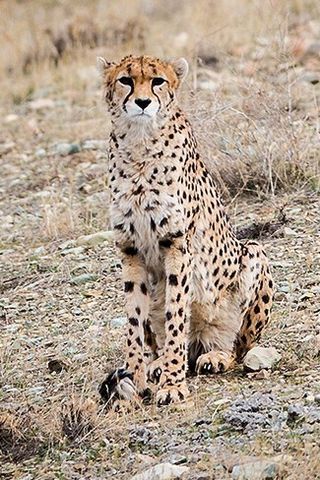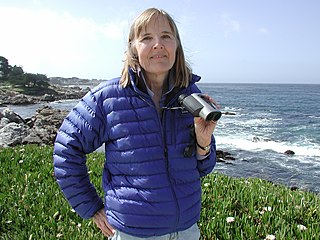Related Research Articles
London Zoo, previously known as ZSL London Zoo or London Zoological Gardens and sometimes called Regent's Park Zoo, is the world's oldest scientific zoo. It was opened in London on 27 April 1828, and was originally intended to be used as a collection for scientific study. In 1831 or 1832, the animals of the Tower of London menagerie were transferred to the zoo's collection. It was opened to the public in 1847. As of December 2022, it houses a collection of 14,926 individuals, making it one of the largest collections in the United Kingdom.

The Zoological Society of London (ZSL) is a charity devoted to the worldwide conservation of animals and their habitats. It was founded in 1826. Since 1828, it has maintained London Zoo, and since 1931 Whipsnade Zoo.

Whipsnade Zoo, formerly known as ZSL Whipsnade Zoo and Whipsnade Wild Animal Park, is a zoo and safari park located at Whipsnade, near Dunstable in Bedfordshire, England. It is one of two zoos that are owned by the Zoological Society of London (ZSL), a charity devoted to the worldwide conservation of animals and their habitats.

Sir Paul Patrick Gordon Bateson, was an English biologist with interests in ethology and phenotypic plasticity. Bateson was a professor at the University of Cambridge and served as president of the Zoological Society of London from 2004 to 2014.
The Institute of Zoology (IoZ) is the research division of the Zoological Society of London (ZSL) in England. It is a government-funded research institute specialising in scientific issues relevant to the conservation of animal species and their habitats. The Institute is based alongside London Zoo at ZSL's Regent's Park site in the City of Westminster.
Sir John Hartley Lawton is a British ecologist, RSPB Vice President, President of the Yorkshire Wildlife Trust, President of The Institution of Environmental Sciences, Chairman of York Museums Trust and President of the York Ornithological Club.

The Asiatic cheetah is a critically endangered cheetah subspecies currently only surviving in Iran. Its range once spread from the Arabian Peninsula and the Near East to the Caspian region, Transcaucasus, Kyzylkum Desert and northern South Asia, but was extirpated in these regions during the 20th century. The Asiatic cheetah diverged from the cheetah population in Africa between 32,000 and 67,000 years ago.

The Living Planet Index (LPI) is an indicator of the state of global biological diversity, based on trends in vertebrate populations of species from around the world. The Zoological Society of London (ZSL) manages the index in cooperation with the World Wide Fund for Nature (WWF).

21st Century Tiger raises funds for wild tiger conservation projects. It was formed in 1997 as a partnership between the Zoological Society of London (ZSL), Global Tiger Patrol (GTP) and Tusk Force so that the three groups could collaborate, rather than compete, in raising money for tigers in the UK. The two current members of the coalition are ZSL and Dreamworld Wildlife Foundation (DWF). Based in offices provided by ZSL in Regent's Park, London, and with administration funded by a sponsor, it is able to spend 100% of funds raised on tiger projects. 21st Century Tiger is one of the top seven contributors to tiger conservation worldwide and since its inception it has provided over £2 million to over 70 tiger projects in seven countries.

"Fart Proudly" is the popular name of an essay about flatulence written by Benjamin Franklin c. 1781 while he was living abroad as United States Ambassador to France. It is an example of flatulence humor.
Tim Flach is a British photographer who specialises in studio photography of animals. He has published several books of photographs.
The Stamford Raffles Award is an award of the Zoological Society of London. It is "For distinguished contributions to zoology by amateur zoologists or professional zoologists in recognition of contributions which are outside the scope of their professional activities." The first awards were sculptures by Henry Moore called 'Animal Form', followed later by sculptures called 'Young Hippo' by Anita Mandl.
This is a list of the fastest animals in the world, by types of animal.

Katherine S. Ralls is an American zoologist and conservationist who is Senior Research Zoologist Emerita at the Smithsonian Conservation Biology Institute, National Zoological Park. Ralls' research interests are in the behavioral ecology, genetics, and conservation of mammals, both terrestrial and marine. Since 1980, she has focused on conservation biology, especially the genetic problems of small captive and wild populations.
The Marsh Award for Conservation Biology, established 1991, is an award run in partnership between the Zoological Society of London (ZSL) and the Marsh Charitable Trust that recognises an individual for his or her "contributions of fundamental science to the conservation of animal species and habitats".
Ralph Louis Obendorf is an Emeritus Professor of Crop Physiology at Cornell University who is notable for his research on the health-related components in seeds, particularly fagopyritol A1, which is isosteric to an insulin mediator believed to be deficient in subjects with non-insulin dependent diabetes mellitus and polycystic ovary syndrome, which affects 10% of women of reproductive age.
Ben C. Sheldon is the Luc Hoffmann Chair in Field Ornithology and Director of the Edward Grey Institute of Field Ornithology of the University of Oxford's Department of Zoology. He was Head of the Department of Zoology between 2016 and 2021.
Debbie Pain is a conservation biologist and ecotoxicologist working on endangered birds around the world. Since 1988 she has led projects into reversing the decline in several species through research, practical and policy measures at the Royal Society for the Protection of Birds and Wildlife and Wetlands Trust.

Earyn McGee is an American herpetologist and science communicator. She is an American Association for the Advancement of Science (AAAS) IF/THEN Ambassador and a 2020 AAAS Mass Media Science & Engineering Fellow. In response to the racism faced by Black birdwatcher Christian Cooper in the Central Park birdwatching incident, McGee co-organized Black Birders Week to celebrate Black birders.
References
- ↑ Rabaiotti, Dani; Caruso, Nick (5 September 2017). Does It Fart?. Hatchette Books. ISBN 9780316484138.
- 1 2 3 "Daniella Rabaiotti". Zoological Society of London (ZSL). Retrieved 2 January 2018.
- ↑ "Biodiversity & Ecology". The London NERC DTP. 2 April 2014. Archived from the original on 3 January 2018. Retrieved 2 January 2018.
- ↑ "People". www.ucl.ac.uk. Retrieved 2 January 2018.[ permanent dead link ]
- 1 2 Cressey, Daniel (2016). "The science you showed us". Nature. doi:10.1038/nature.2016.19178. S2CID 186406151.
- ↑ "A dog's life: Using conservation technology to monitor African wild dogs". Zoological Society of London (ZSL). Retrieved 2 January 2018.
- ↑ "Kenya Rangelands Wild Dog and Cheetah Project". Zoological Society of London (ZSL). Retrieved 2 January 2018.
- ↑ "Range Wide Conservation Program". www.cheetahandwilddog.org. Retrieved 2 January 2018.
- ↑ "BES Blog: Westminster, waste and wildlife crime". British Ecological Society. 14 February 2017. Retrieved 2 January 2018.
- ↑ "POST Fellowships". UK Parliament. Retrieved 2 January 2018.
- ↑ Wentworth, Jonathan; Rabaiotti, Daniella (31 January 2017). "Environmental Crime".
- ↑ "Dani Rabaiotti". In Verba. Royal Society. Archived from the original on 3 January 2018. Retrieved 2 January 2018.
- ↑ "Voice of the Future 2017: a scientist's perspective". British Ecological Society. 22 March 2017. Retrieved 2 January 2018.
- ↑ Brueck, Hilary. "Why A Bunch Of Scientists Are Heckling Bill Nye With #BillMeetScienceTwitter". Forbes. Retrieved 2 January 2018.
- ↑ "#billmeetsciencet hashtag on Twitter". twitter.com. Retrieved 2 January 2018.
- ↑ "Bill Nye Saves the World". www.netflix.com. Retrieved 2 January 2018.
- ↑ BBC Wildlife Magazine. 22 November 2017 https://www.pressreader.com/uk/bbc-wildlife-magazine/20171122 . Retrieved 2 January 2018– via PressReader.
{{cite magazine}}: Missing or empty|title=(help) - ↑ Mandelbaum, Ryan F. "Brilliant Scientists Are Compiling a Database of Farting Animals". Gizmodo. Retrieved 2 January 2018.
- ↑ "Animal farts: A mighty wind | Brains On! Science podcast for kids on acast". acast. 29 August 2017. Archived from the original on 3 January 2018. Retrieved 2 January 2018.[ dead link ]
- ↑ "Scientists Are Creating A Database Of Farting Animals". HuffPost UK. 11 January 2017. Retrieved 2 January 2018.
- ↑ Bittel, Jason (11 January 2017). "Scientists are building an animal fart database". Washington Post. ISSN 0190-8286 . Retrieved 2 January 2018.
- ↑ "Student co-authors popular science book, "Does it Fart?"". The London NERC DTP. 31 October 2017. Archived from the original on 3 January 2018. Retrieved 2 January 2018.
- ↑ "Do animals fart?". Science Focus. Archived from the original on 3 January 2018. Retrieved 2 January 2018.
- ↑ "Everything you need to know about animal flatulence". Discover Wildlife. Archived from the original on 3 January 2018. Retrieved 2 January 2018.
- ↑ "Some Animals Don't Fart, Say Scientists Whose Salaries Are Paid For By Your Taxes". Men's Health. 10 January 2017. Retrieved 2 January 2018.
- ↑ Becker, Rachel (21 October 2018). "Flatworms fence with their penises and other fun science facts". The Verge. Retrieved 2 January 2019.